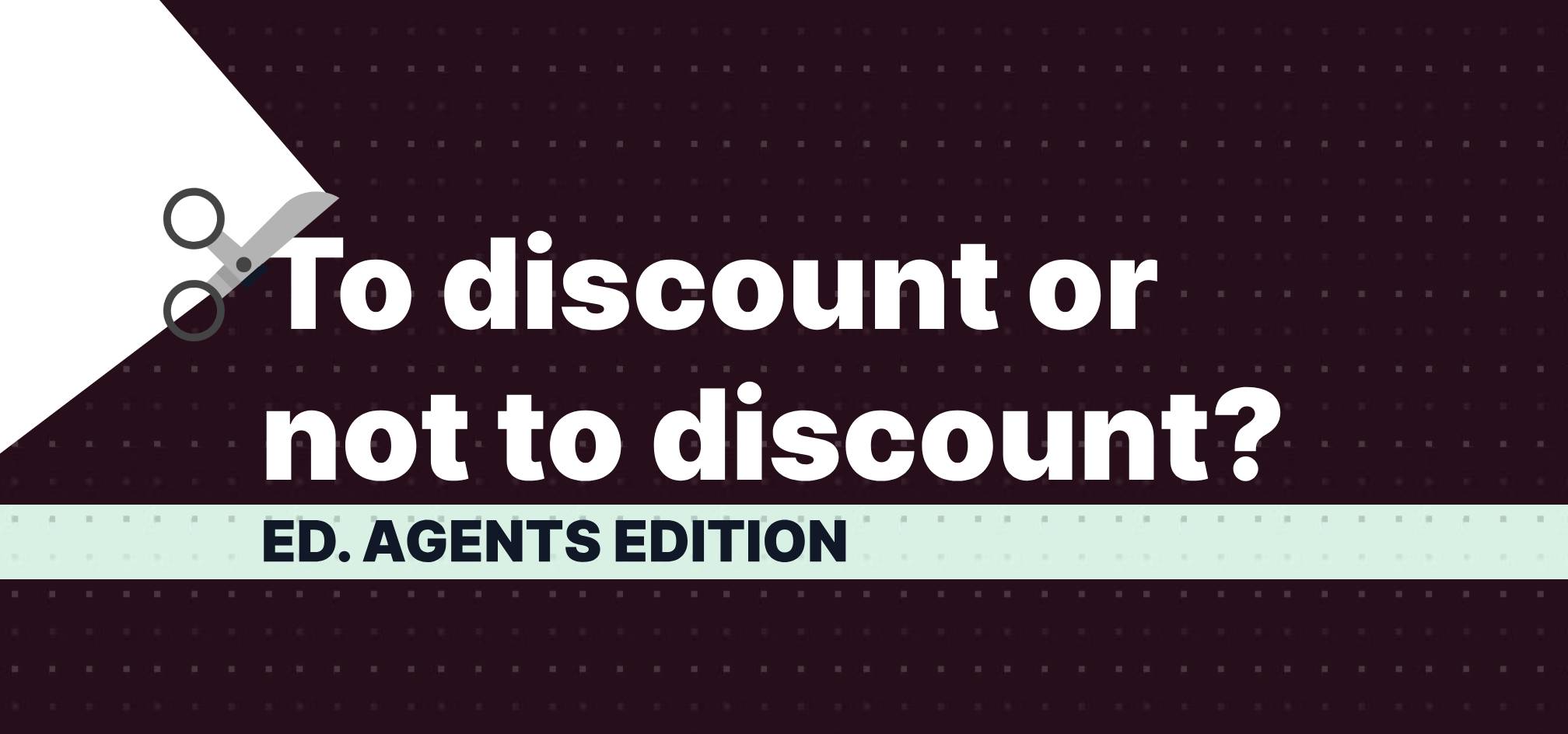Education agents often face unique pressures when it comes to discounts. Some choose to offer discounts from their commission as a way to sweeten the deal for students or parents, hoping it’ll seal the enrollment. On the surface, it seems like a clever move—it’s an investment in building trust and increasing conversions. But is it really? Let’s unpack this.
Discounts from Commission: The Double-Edged Sword
When an agent dips into their commission to offer discounts, it might attract students initially, but it sets a precedent. The more you do it, the more students (and schools) come to expect it. Suddenly, your commission isn’t a reward for your hard work—it’s a bargaining chip.
And here’s where things get tricky:
- Thin Margins: Your earnings take a hit every time you discount your commission. If this becomes a habit, how will you sustain your business?
- Devaluing Your Expertise: Your role as an agent isn’t just to facilitate payments—it’s to provide guidance, support, and expertise. By offering frequent discounts, you risk undervaluing the real value you bring to the table.
- The “Free Work” Trap: If schools and students get used to discounted commissions, they might start expecting additional services for free. Where do you draw the line?
Bonuses: Tempting, But Are They Sustainable?
Schools sometimes offer agents bonuses for hitting enrollment targets. While this can be a motivator, relying on these bonuses can be dangerous. Why? Because bonuses, like discounts, can create dependency.
Imagine this: you’re working with a school that offers a $1,000 bonus for every 10 students enrolled. That’s great—for now. But what happens if the bonus disappears next year? Or if a competitor offers a bigger one? Chasing bonuses can shift your focus away from finding the right fit for students and toward short-term gains.
Here’s how to avoid falling into the bonus trap:
- Diversify Your Portfolio: Don’t rely too heavily on schools that incentivize with bonuses. Work with institutions that align with your values and offer consistent, fair commissions.
- Focus on Long-Term Relationships: Building strong relationships with both students and schools creates loyalty that’s worth far more than any bonus.
- Advocate for Value, Not Price: Emphasize the quality of the education and the experience, rather than relying on financial perks to close the deal.
The Race to the Bottom
Here’s the ugly truth: when discounts become the norm, it’s a race to the bottom. Education agents start undercutting one another, trying to offer the lowest price to win students. But at what cost?
If everyone’s slashing commissions and relying on bonuses, here’s what happens:
- Reduced Professional Standards: Agents may cut corners to save costs, affecting the quality of service.
- Devalued Industry: Education agents are professionals, but constant discounting can erode that perception.
- Student Mistrust: If students see agents competing purely on price, they may question the legitimacy of the advice they’re getting.
Instead, aim to stand out by providing exceptional service, deep knowledge, and personal attention. When students and schools see the value in what you offer, the conversation shifts from price to quality.
Discounts to Encourage Payments Through Agents: A Balanced Approach
In the education payments ecosystem, some agents offer discounts to students to incentivize payments through their accounts rather than directly to the school. It’s a strategy that can have clear benefits for agents—particularly for managing cash flow—but it also brings additional responsibilities and potential pitfalls. Let’s take a closer look at how this approach can work when managed thoughtfully.
Why Agents Steer Payments Their Way
The primary motivation for this strategy is simple: cash flow. When payments flow through an agent, it allows them to:
- Improve Liquidity: Funds are received upfront, ensuring the agent has better control over their finances.
- Maintain a Central Role: By positioning themselves as the primary payment point, agents stay firmly in the loop, fostering stronger relationships with students and schools.
- Simplify Commission Reconciliation: By handling payments directly, agents can ensure their commission is settled without having to rely on schools to track and process it. For many agents, this setup makes financial and operational sense. But it’s not without challenges.
The Trade-Offs: More Control, More Responsibility
While handling payments directly improves cash flow, it also increases back-office workloads. Processing payments, issuing receipts, tracking balances, and reconciling accounts can become time-consuming—especially as your student base grows.
And that’s where tools like Qualy can make a real difference. By automating key parts of the payment process—like splitting tuition and commission, generating invoices, and integrating with accounting systems—agents can focus less on admin and more on supporting students.
However, even with the right tools, there are other factors to consider:
- Transparency Is Key: Students and families need to fully understand why they’re paying the agent instead of the school. Clear communication builds trust.
- Compliance Matters: Ensure your processes align with local regulations for handling tuition payments. Missteps here can have serious consequences.
- Reputation Management: Some schools may view this approach as adding complexity to their payment workflows. Open communication with institutional partners is crucial to maintain strong relationships.
Tips for a Sustainable Approach
If you’re an agent offering discounts to channel payments through your account, here’s how to manage it healthily:
- Set Clear Terms: Define exactly how and when the discount applies. For example, offer it only for early payments or specific payment methods like direct debit.
- Use Technology Wisely: A system like Qualy can help you manage payment flows seamlessly, reducing errors and saving time.
- Don’t Overdo Discounts: While discounts can encourage payments, offering them too frequently or at too high a rate can erode your margins. Keep them moderate and tied to specific behaviors, like early payments or recurring payment setups. Maintain Transparency: Make sure students understand how the discount benefits them and that the payment is still being passed on to the school securely and promptly.
- Partner with Schools Strategically: Work with institutions that recognize the value you bring as an agent and are open to flexible payment arrangements.
Benefits of Doing It Right
When handled properly, this approach can strengthen your business model and relationships:
- Stronger Cash Flow: Steady inflows of funds allow you to better manage operational costs and reduce reliance on credit.
- Enhanced Student Trust: Transparent communication about payment processes builds loyalty.
- Streamlined Operations: With the right tools, managing payments doesn’t have to feel like an uphill battle.
Proceeding with Care
Encouraging payments through your account can be a smart financial strategy, but it requires careful planning and clear communication. Done right, it can benefit students, schools, and agents alike. However, it’s important to maintain a balance—avoiding unnecessary complexity for students or risking strained relationships with partner schools.
The key? Stay transparent, stay compliant, and use tools like Qualy to simplify the process. That way, you can focus on what truly matters: providing excellent guidance and support to your students.
A Smarter Way Forward
If you’re considering discounts as an agent, ask yourself:
- Is this a short-term tactic, or does it support my long-term goals?
- Am I devaluing my own work by offering this discount?
- How will this decision impact my reputation and future business?
Rather than cutting commissions, look for other ways to add value:
- Talk to your key schools, and offer flexible payment plans to your students.
- Provide in-depth consultations or extra support at no additional cost.
- Partner with schools that align with your goals and treat agents as true collaborators, to streamline visas, enrollments and make the process smoother for everyone.
- Provide additional services like airport pickups, accommodation assistance, or language meetups to differentiate yourself from the competition.
- Invest in technology that streamlines your processes, so you can focus on building relationships and providing top-notch service.


